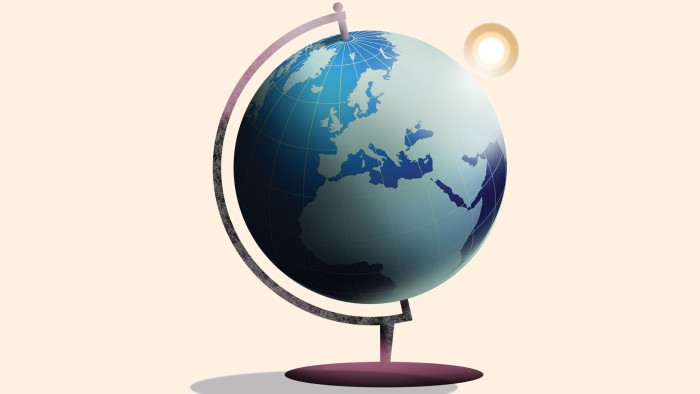The sun sets on the west


Roula Khalaf, Editor of the FT, selects her favourite stories in this weekly newsletter.
There’s a story the American writer PJ O’Rourke loves to tell about anti-Americanism. Covering Lebanon’s civil war in 1984, he kept getting stopped at Hizbollah-run checkpoints. Eventually he reached one staffed by armed teenagers wearing “Kill America Satan Devil” T-shirts. When O’Rourke produced his American passport, one kid began berating him, “telling me how all the terrible things wrong with the world were caused by America – poverty, war, injustice, Zionism”. Finally the kid stopped, and told O’Rourke his career plan: he aimed to study dentistry in Dearborn, Michigan.
The story perfectly captures the feelings of many people worldwide towards the west: a mixture of hatred and desire. It’s probably how some Native Americans felt about Columbus in 1492. Anti-western leaders such as Osama bin Laden, Ayatollah Khomeini, Robert Mugabe and Hugo Chávez all distorted and exploited these anti-western feelings. But if the west really is losing global significance – as recently displayed in Syria – then anti-western movements are in trouble. Western military and economic decline could reduce anti-western feeling. In other words, by becoming weaker we westerners may become safer.
Ever since Columbus, we have been getting into people’s faces worldwide – first as colonisers, then during the cold war and, later, in the “war on terror”. Sometimes we intervened on the side of good against evil, sometimes for evil against good and, more often, for bad against bad. Foreign-policy “realists” say we need a global presence to protect our interests. There is something in that. Moreover, intervention gives western foreign-policy types something to do. However, the flipside is that if you keep getting into people’s faces, sometimes they will hit you.
It wasn’t only our gunboats that upset non-westerners, as Ian Buruma and Avishai Margalit explain in their book Occidentalism. So did our capitalism, our lecturing (which quietened down only after the botched Iraq war) and our sexual licence. While studying in Greeley, Colorado, in 1949, Sayyid Qutb, Egyptian thinker of the Muslim Brotherhood, watched appalled as young American women danced with men to “Baby, It’s Cold Outside”. “Arms twisted around hips; lips met lips; chests pressed together,” Qutb recalled with hatred (and desire?) in his article “The America I Have Seen”.
Generally, westerners treated non-westerners as subject peoples. Repeated humiliations still leave marks today. An Iranian publisher, defending his decision to translate one of my books without paying for it, emailed me: “I wish you contemplate about the source of wealth of your small neighbouring countries and see that is the result of their own toil, or it is the result of exploitation of some hundred millions of people throughout the third world?”
Often, writes the economist-philosopher Amartya Sen, non-westerners consoled themselves with the thought that while the west had material stuff, they themselves had soulfulness – hence all the rants against “American materialism”. But as Sen notes, anti-westerners demeaned themselves by thinking so much about the west: “To dedicate one’s life to undermining the west and to blowing up prominent [western] edifices… reflects an obsession with the west that overwhelms all other priorities and values.” Such people have “colonised minds”, says Sen.
Now anti-western obsessions are fading. It’s not merely that the west is intervening less (except in Pakistan and Yemen, where we’re helping to keep anti-western fires burning brightly) but also that we have ceased to be global poster-boys for materialism. Indeed, westerners now often mock rich Chinese, Arabs and Russians for their love of bling. Eastern cities jammed with skyscrapers and Gucci increasingly represent stuff, while the west, with its museums and old monuments, is claiming soul.
…
It’s no coincidence that as the west shrivels, anti-western ranters such as Chávez, Mahmoud Ahmadinejad and bin Laden have exited the global stage, without like-for-like replacements. The Castros now worry more about Cuba’s shortcomings than America’s. Only Mugabe still honours Britain by seeing its evil hand everywhere – but then he’s 89.
Most younger people care less about the west. Ntone Edjabe, Cameroonian editor of the pan-African magazine Chimurenga, says of African writing today: “You are not writing about the white man. This is not the person I have a beef with. I don’t even know him. The guy I have a beef with is the shebeen owner.”
The US, once the Great Satan of Iranian demonstrators, is now Medium-Sized Satan at best. Britain is Tiny Satan. In 20 years, we might see demonstrators in faraway countries burning Chinese flags, or global terrorists targeting China.
With our military and economic might waning, only one supposedly western feature remains to rile the anti-west: our sexual liberty. That’s why anti-western populists are now choosing sexual propriety as their unique selling point. And so the veil spreads further in Islamic countries, while African and Russian populists attack both gays and the topless feminist movement Femen. Nish Gera, an Indian writer and entrepreneur in New York, whose mother vomited when he came out as gay, says most Indians consider homosexuality a “western disease”. But to turn the anti-western movement into an anti-sex crusade might not prove a brilliant recruiting strategy.
——————————————-
simon.kuper@ft.com; Twitter @KuperSimon
Comments